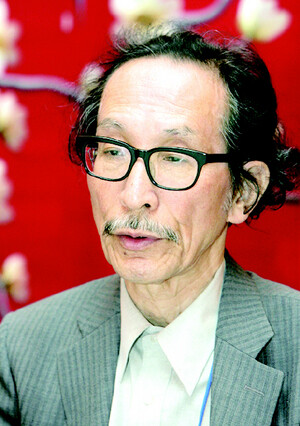hankyoreh
Links to other country sites 다른 나라 사이트 링크
Japanese prof. says Korea and Japan must seek real solution to Dokdo

By Gil Yun-hyung, staff reporter
South Korea and Japan have clashed repeatedly over the Dokdo issue in recent months, but how can the thorny dispute be resolved? A leading Japanese conscientious intellectual, Wada Haruki, Emeritus Professor of Tokyo University, maintains, “Instead sweeping the issue of Dokdo under the rug, South Korea and Japan should put their heads together and actively seek a solution.”
Prof. Wada took part in a meeting of experts hosted by Kookmin University Institute of Japanese Studies on Nov. 2. There he stated there were three main options for South Korea and Japan to choose from concerning Dokdo. First, continuing the enmity while holding fast to “territorial sovereignty,” second, putting the issue on the back burner to prevent it from harming bilateral relations, and third, taking proactive steps towards a solution.
Since President Lee Myung-bak’s visit to Dokdo in August, the South Korean public and Japan have claimed “territorial sovereignty” from nationalistic standpoints while experts have been bent on “holding off the issue,” not to let it strain other areas of bilateral ties. Two books recently published in Japan have each sold more than one million copies: political commentator Magosaki Ukeru’s “Japan’s Border Problems” and “Japan’s Territorial Issue” written by Togo Kazuhiko, professor of Kyoto Sangyo University. Both those argued leaned towards the position that the issue should be put on the back burner. On the other hand, Prof. Wada’s recently published book “How to Resolve Territorial: from Confrontation to Conversation” argues for an active resolution to the issue.
Wada suggested three principles for the solution: active utilization of treaties and declarations between the two countries; respect for what has occurred up to now concerning the livelihood of residents; and the harmonization of bilateral interests. With three principles being applied for the Dokdo issue, the two countries have to actively work on negotiations, after admitting that the Dokdo islets are a disputed territory, according to the “exchanged official letters pertaining to the resolution of disputes”, as part of the process of normalization of bilateral ties in 1965.
If seeing the Dokdo issue as a matter to be negotiated creates resistance on its own, let us first hear the professor out. Prof. Wada says, “Japan incorporated Dokdo into its territory in 1905 and illegally occupied the precious national land of the Chosun people,” adding, “Because of that, it is not ethical for Japan to claim territorial sovereignty over Dokdo and pronounce South Korea’s governance of Dokdo an illegal occupation as long as it is also stating regret for Japan‘s colonization of Korea.”
To the Japanese side he advised, “Ceasing unrealistic claims over Dokdo, which is governed by Korea, as soon as possible will benefit future bilateral relations.” The crux of his argument is that acknowledging Dokdo as Korean territory is the only path left for Japan both ethically and realistically.
In return, he claimed, the South Korean government also should not designate Dokdo as a starting point of the state’s exclusive economic zone (EEZ) in accordance with the United Nations Convention on the Law of the Sea, and should ensure the fishing rights of Japanese fishermen as they stand now. He said, “Without resolving the Dokdo issue, how can it be possible to talk about East Asian peace?” adding, “Now is the perfect time to resolve this issue, as the Japanese people have been hearing a lot about Takeshima [Dokdo].”
Lee Won-deog, director of the Institute of Japanese Studies said, “In terms of Koreans’ national sentiment, there are many aspects of his ideas that would be impossible to accept, but his opinion that we must aggressively and swiftly move to solve the Dokdo issue is a very fresh take on the matter.”
Please direct questions or comments to [english@hani.co.kr]

Editorial・opinion
![[Column] Park Geun-hye déjà vu in Yoon Suk-yeol [Column] Park Geun-hye déjà vu in Yoon Suk-yeol](https://flexible.img.hani.co.kr/flexible/normal/500/300/imgdb/original/2024/0424/651713945113788.jpg) [Column] Park Geun-hye déjà vu in Yoon Suk-yeol
[Column] Park Geun-hye déjà vu in Yoon Suk-yeol![[Editorial] New weight of N. Korea’s nuclear threats makes dialogue all the more urgent [Editorial] New weight of N. Korea’s nuclear threats makes dialogue all the more urgent](https://flexible.img.hani.co.kr/flexible/normal/500/300/imgdb/original/2024/0424/7317139454662664.jpg) [Editorial] New weight of N. Korea’s nuclear threats makes dialogue all the more urgent
[Editorial] New weight of N. Korea’s nuclear threats makes dialogue all the more urgent- [Guest essay] The real reason Korea’s new right wants to dub Rhee a founding father
- [Column] ‘Choson’: Is it time we start referring to N. Korea in its own terms?
- [Editorial] Japan’s rewriting of history with Korea has gone too far
- [Column] The president’s questionable capacity for dialogue
- [Column] Are chaebol firms just pizza pies for families to divvy up as they please?
- [Column] Has Korea, too, crossed the Rubicon on China?
- [Correspondent’s column] In Japan’s alliance with US, echoes of its past alliances with UK
- [Editorial] Does Yoon think the Korean public is wrong?
Most viewed articles
- 1‘We must say no’: Seoul defense chief on Korean, USFK involvement in hypothetical Taiwan crisis
- 2Will NewJeans end up collateral damage in internal feud at K-pop juggernaut Hybe?
- 3[Column] Park Geun-hye déjà vu in Yoon Suk-yeol
- 4Why Korea shouldn’t welcome Japan’s newly beefed up defense cooperation with US
- 5Thursday to mark start of resignations by senior doctors amid standoff with government
- 6N. Korean hackers breached 10 defense contractors in South for months, police say
- 7[Guest essay] The real reason Korea’s new right wants to dub Rhee a founding father
- 8[Column] ‘Choson’: Is it time we start referring to N. Korea in its own terms?
- 9Kim Jong-un expressed ‘satisfaction’ with nuclear counterstrike drill directed at South
- 10[Editorial] New weight of N. Korea’s nuclear threats makes dialogue all the more urgent